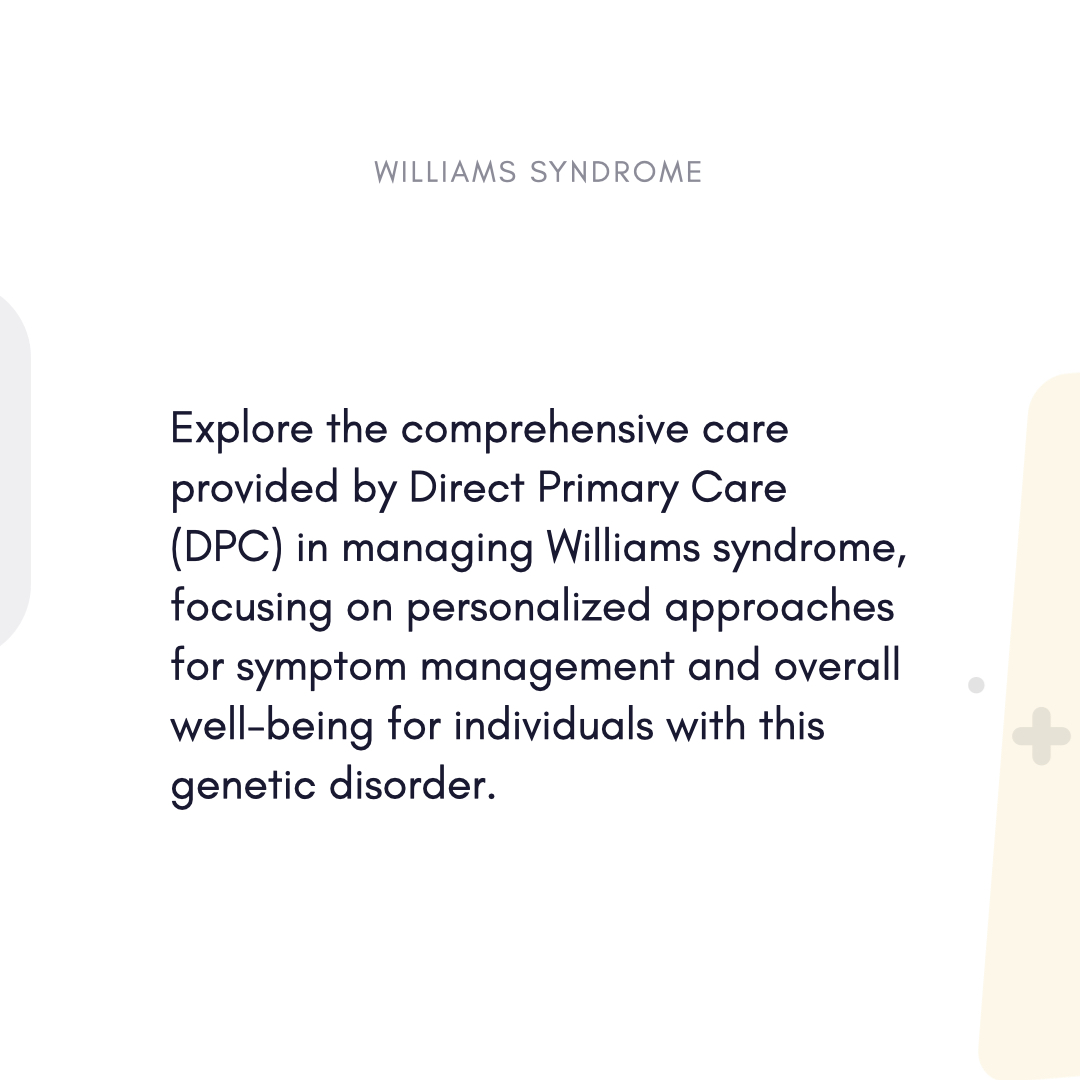Williams Syndrome and Direct Primary Care (DPC): Holistic Care for a Complex Genetic Disorder
You know you need coordinated, lifetime care if you have negotiated the difficulties of Williams Syndrome (WS)—balancing heart problems, developmental delays, and the pleasures of a sociable personality. Affecting one in 10,000 births, WS calls for a multimodal strategy. Direct Primary Care (DPC), which combines continuous monitoring, specialist coordination, and techniques to improve quality of life, presents a patient-centered model to manage WS, however.

Understanding Williams Syndrome and Its Difficulties
A genetic condition resulting from a deletion on chromosome 7, Williams syndrome causes:
- Cardiovascular problems: Hypertension; supravalvular aortic stenosis (SVAS).
- Developmental delays: mildly to moderately intellectual disability.
- Elfin has distinct facial features and a hyper-social personality.
Multiple system involvement:
- Endocrine: Thyroid problems and hypercalcemia.
- Gastrointestinal: GERD and food challenges.
- Musculoskeletal: scoliosis, joint laxity.
DPC Turns Around WS Attention
Under the membership arrangement known as Direct Primary Care (DPC), which usually runs 50 USD–150 USD, families pay a monthly fee for unrestricted access to their primary care physician. For WS patients, this translates into no surprise bills, no waiting months for specialist consults, and treatment tailored to your child's particular needs.
Here's why DPC distinguishes itself:
1. Constant, organized treatment
DPC doctors follow Williams Syndrome Association recommendations including:
- Cardiac monitoring consists in annual echocardiograms and blood pressure readings.
- Calcium/vitamin D control: Avoiding hypercalcemia.
- Developmental assessments: OT, speech referrals for early intervention.
2. Reasonably Priced, All-Inclusive Support
- DPC clinics negotiate cash rates for cardiology visits and genetic testing, so lowering costs.
- Should necessary, provide growth hormone treatment at wholesale rates.
- Preventing ER trips with aggressive symptom control.
3. Family-Centered Holistic Approach
Families can:
- Change feeding schedules for GERD or oral aversions using 24/7 access to your DPC physician.
- Control behavioral problems with customized plans.
- Get materials for 504 plans and educational advocacy.
Advantages of DPC for WS Patients
Customized Health Plans
- Each visit, DPC doctors spend 30 to 60 minutes developing plans including:
- Working with pediatric cardiologists, cardiac surveillance is underlined.
- Calcium-restricted diets and vitamin D supplements are nutritional supports.
- Behavioral therapies include anxiety control and social skills development.
Financial Reductions
- There are no co-pays for regular developmental screenings.
- Echocardiograms funded at 500 USD against 2,000 USD+ with insurance.
- Early SVAS detection helps one avoid hospitalizations.
Effortless Specialist Coordination
DTC guarantees:
- Referrals to endocrinology for thyroid or growth problems.
- GI consults: For control of constipation or reflux.
- Integration of mental health: CBT for common WS anxiety.
Actual Success Stories in Life
- Case 1: Emma, eight, used DPC's early SVAS monitoring and medication to avoid heart surgery.
- Case 2: With DPC's IEP advocacy and OT referrals, 12-year-Liam flourished academically.
Ask questions about Williams Syndrome and DPC.
- Q: Can DPC control hypercalcemia associated to WS?
- A: Certainly. DPC tracks calcium levels and changes diets and supplements in line.
- Q: Does DPC make sense for lifetime WS treatment?
- A: Yes. Flat-rate pricing addresses limitless consultations and care coordination.
- Q: Should my child require a specialist not within the DPC network, what then?
- A: A DPC shares records to stop repetitions and helps negotiate cash-pay rates.
Why DPC Wins for WS Families: Why
Early, planned treatment is stressed by the Williams Syndrome Association. DPC presents this through:
- Early identification of complications: routine metabolic and cardiac inspections.
- Empowering families: advocacy and WS traits education.
- Costs should be simplified. One monthly cost covers all main and specialist coordination.
Use DPC to empower your child's journey.
Williams syndrome does not restrict possible outcomes. Every test, every treatment, every milestone—DPC gives you a partner who advocates, coordinates, and prioritises your child's health.






